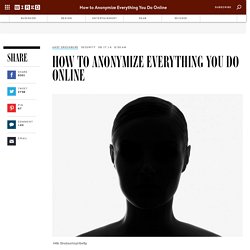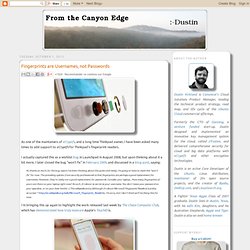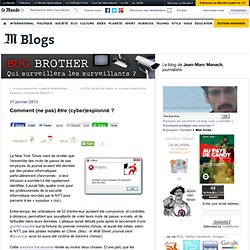

How to Anonymize Everything You Do Online. One year after the first revelations of Edward Snowden, cryptography has shifted from an obscure branch of computer science to an almost mainstream notion: It’s possible, user privacy groups and a growing industry of crypto-focused companies tell us, to encrypt everything from emails to IMs to a gif of a motorcycle jumping over a plane.

But it’s also possible to go a step closer toward true privacy online. Mere encryption hides the content of messages, but not who’s communicating. Use cryptographic anonymity tools to hide your identity, on the other hand, and network eavesdroppers may not even know where to find your communications, let alone snoop on them. “Hide in the network,” security guru Bruce Schneier made his first tip for evading the NSA. “The less obvious you are, the safer you are.” Though it’s hardly the sole means of achieving online anonymity, the software known as Tor has become the most vouchsafed and developer-friendly method for using the Internet incognito. Email.
Twitter turquie - contourner censure - Rue89. La version turque du mode d’emploi Grâce à l’aide d’un traducteur, ce mode d’emploi est disponible en turc, à cette adresse. Rue89 Le Premier ministre Erdogan l’avait annoncé, il l’a fait. Jeudi soir, le gouvernement conservateur turc a fermé l’accès à Twitter depuis la Turquie pour « des raisons de sécurité ». Une mesure qui provoque le courroux des utilisateurs du réseau social, et des pays de l’Union européenne. . « L’interdiction de Twitter en Turquie est sans fondement, inutile et lâche. Une censure symbolique certes, mais peu efficace en réalité au regard des moyens qui existent pour contourner une telle interdiction, développés par les communautés d’internautes confrontés aux censures chinoise et nord-coréenne.
Si vous nous lisez depuis la Turquie, soyez rassurés : quand il y a deux ans encore, il aurait fallu être un utilisateur aguerri pour outrepasser cette prohibition, aujourd’hui trois clics suffisent. Tor (The Onion Router) est un réseau informatique mondial « parallèle ». GSM Security Map. White Cube opens a Hong Kong gallery. Adding to the burgeoning art scene in Hong Kong is a new gallery from London art powerhouse, White Cube. Collectors and artists swarmed in from all around the region for the opening night of the first exhibition, dedicated to British artists Gilbert & George, whose London Pictures series is also on show in White Cube's three London galleries.
Located on Connaught Road, the Hong Kong outpost is White Cube's first overseas venture. It takes over the ground and first floor of a 27-storey tower, by New York-based architect Robert AM Stern. The gallery is a generous space of 550 m². London-based Maybank and Matthews Architects have captured the spirit and standard of White Cube, creating a clean and classic gallery, cleverly playing with light and shadow. On the walls are 22 pictures from Gilbert & George's London Pictures series, which is based on posters from London newspaper sellers' posters they have stolen over the last six years.
Why Hong Kong and why now? Why right now? From the Canyon Edge: Fingerprints are Usernames, not Passwords. As one of the maintainers of eCryptfs, and a long time Thinkpad owner, I have been asked many times to add support to eCryptfs for Thinkpad's fingerprint readers.

I actually captured this as a wishlist bug in Launchpad in August 2008, but upon thinking about it a bit more, I later closed the bug "won't fix" in February 2009, and discussed in a blog post, saying: Hi, thanks so much for the bug report.I've been thinking about this quite a bit lately. I'm going to have to mark this "won't fix" for now. The prevailing opinion from security professionals is that fingerprints are perhaps a good replacement for usernames. However, they're really not a good replacement for passwords. There may be civil liberties at issue as well. But let's just say you're okay with Apple sharing your fingerprints with the NSA, as I've already told you, they're not private at all. Comment (ne pas) être (cyber)espionné ? Le New York Times vient de révéler que l’ensemble des mots de passe de ses employés du journal avaient été dérobés par des pirates informatiques particulièrement chevronnés : si leur intrusion a semble-t-il été rapidement identifiée, il aurait fallu quatre mois pour les professionnels de la sécurité informatique recrutés par le NYT pour parvenir à les « expulser » (sic).

Entre-temps, les ordinateurs de 53 d’entre-eux auraient été compromis, et contrôlés à distance, permettant aux assaillants de voler leurs mots de passe, e-mails, et de farfouiller dans leurs données. L’attaque aurait débuté juste après le lancement d’une grande enquête sur la fortune du premier ministre chinois, et aurait été initiée, selon le NYT, par des pirates installés en Chine. (MaJ : le Wall Street Journal vient d'annoncer avoir lui aussi été victime de hackers chinois). Cette annonce fracassante révèle au moins deux choses. #CyberBunker That Internet War Apocalypse Is a Lie. Phishing Initiative - Soumettez vos phishing présumés afin de contribuer à la lutte ! Tails - Confidentialité et anonymat, pour tous et partout.